Search
for
Sort by
Research
930-960 / 1000+ results
research Expanding The Phenotype Of Hyper-IgE Syndrome: Heterozygous Variant In IL6ST With Elevated Serum IgE And Isolated Abscesses
A new IL6ST gene variant may cause a unique form of hyper-IgE syndrome with skin abscesses and high IgE levels.
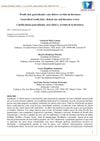
research Generalized Woolly Hair: Case Report and Literature Review
Woolly hair is a rare genetic condition with no effective treatments.
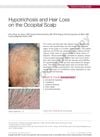
research Hypotrichosis and Hair Loss on the Occipital Scalp
A baby girl has a hair disorder called monilethrix, causing fragile hair that may improve over time.

research Marie-Unna Hereditary Hypotrichosis
A 12-year-old boy with a rare genetic condition has progressive hair loss with no effective treatment.
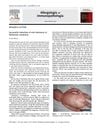
research Successful Induction of Oral Tolerance in Netherton Syndrome
A girl with Netherton syndrome was able to eat wheat without allergies after a special treatment.

research Retinol Dehydrogenase 12 (RDH12): Role in Vision, Retinal Disease, and Future Perspectives
The enzyme RDH12 plays a role in vision and retinal disease, with mutations leading to early onset visual loss and blindness, but the exact disease mechanism is unclear and there are no treatments yet.

research CaBP1 and 2 Enable Sustained CaV1.3 Calcium Currents and Synaptic Transmission in Inner Hair Cells
CaBP1 and 2 are necessary for maintaining calcium currents and hearing in inner ear cells.

research A Distinct Gene Close to the Hairless Locus on Chromosome 8p Underlies Hereditary Marie Unna Type Hypotrichosis in a German Family
A different gene near the hairless gene on chromosome 8p21 causes a rare hair loss condition in a German family.
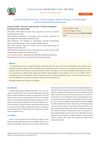
research Localized Hypotrichosis Type 1 Due to Intragenic Deletion of Exons 5-8 in Desmoglein Gene in a Neonate from Indian Family
A baby from an Indian family had a rare genetic disorder causing no scalp or body hair due to a specific gene deletion.

research Gene That Causes Woolly Hair Revealed
Mutations in the P2RY5 gene cause hereditary woolly hair.
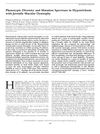
research Phenotypic Diversity and Mutation Spectrum in Hypotrichosis with Juvenile Macular Dystrophy
Different harmful mutations in the CDH3 gene cause HJMD, but symptoms vary among individuals.

research Novel Adenosine Triphosphate-Binding Cassette, Subfamily A, Member 12 Mutations Associated with Congenital Ichthyosiform Erythroderma
New ABCA12 gene mutations were linked to a skin condition with scaling and hair loss, and a treatment helped with hair loss in a related case.
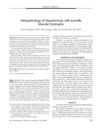
research Histopathology of Hypotrichosis with Juvenile Macular Dystrophy
The research found that a specific gene mutation causes fewer hair follicles and disrupted hair growth cycles, leading to thin and short hair in people with Hypotrichosis with Juvenile Macular Dystrophy.

research WNT10A, Dermatology and Dentistry
Mutations in the WNT10A gene can cause skin, hair, teeth, and other disorders, and may also affect other areas like kidney and cancer, with potential for targeted treatments.

research Genetic Susceptibility to Alopecia
Certain mutations in the PADI3 gene may increase the risk of developing a type of scarring hair loss common in women of African descent.

research Writer’s Cramp Presentation of Woodhouse–Sakati Syndrome – Out of the Woods
Woodhouse-Sakati syndrome can cause writer's cramp and other varied symptoms, highlighting the importance of genetic testing for diagnosis.

research Acrodermatitis Enteropathica – Diagnostic Challenges
Genetic testing confirmed a rare skin disorder in a young girl, which improved with zinc supplementation.
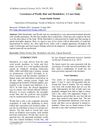
research Coexistence of Woolly Hair and Monilethrix: A Case Study
Two sisters have rare hair disorders causing short, fragile, kinky hair.

research Relationship of a Novel c.429delC Deletion in Hairless Gene HR with Alopecia in Two Families from Southern Punjab, Pakistan
A new mutation in the Hairless gene causes hair loss in two Pakistani families.

research Main Plenary Sessions: Summaries of Papers
UK medical students lack dermatology education, liver biopsy patients with risk factors show more fibrosis, and certain fungi resist drugs due to melanin; genetics may influence female hair loss.

research Epidemiologic Study of Gene Distribution in Romanian and Brazilian Patients with Non-Cicatricial Alopecia
The study suggests that analyzing DNA can help treat hair loss, but more research is needed.
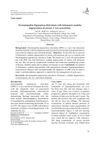
research Dermatopathia Pigmentosa Reticularis with Salzmann’s Nodular Degeneration of Cornea: A Rare Association
An 11-year-old girl with a rare skin disorder also had cornea issues and dry eye, needing careful management.

research Mimicking Hair Disorders by Genetic Manipulation of Organ-Cultured Human Hair Follicles
Scientists can mimic hair disorders by altering genes in lab-grown human hair follicles, but these follicles lack some features of natural ones.
research Premature Termination of Hair Follicle Morphogenesis and Accelerated Hair Follicle Cycling in Iasi Congenital Atrichia (fzica) Mice Points to Fuzzy as a Key Element of Hair Cycle Control
The fuzzy gene is crucial for controlling hair growth cycles.
research Quantification of the Vitamin D Receptor-Coregulator Interaction
Vitamin D receptor binds similarly to natural and synthetic ligands, affecting gene regulation.

research Association of Systemic Involvement with Skin Morphology Assessed by Multiphoton Microscopy in Pseudoxanthoma Elasticum
Skin changes in Pseudoxanthoma elasticum patients can indicate the severity of related health issues.
research Female Androgenetic Alopecia
Female pattern hair loss is different from male pattern hair loss and has unclear genetic causes.

research Uncombable Hair Syndrome Due to Maternal Uniparental Disomy of Chromosome 1
A person got uncombable hair syndrome from two copies of chromosome 1 from their mother.
research Spontaneous Quick Resolution of Uncombable Hair Syndrome-Like Disease
A boy's hair that was frizzy and hard to comb returned to normal after 9 months, possibly due to genetic factors.